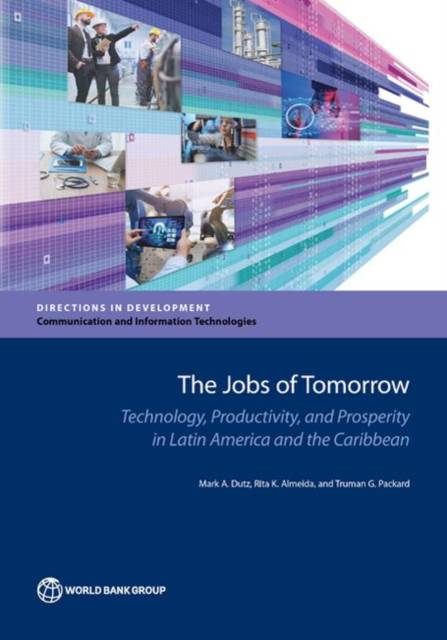
- Retrait gratuit dans votre magasin Club
- 7.000.000 titres dans notre catalogue
- Payer en toute sécurité
- Toujours un magasin près de chez vous
- Retrait gratuit dans votre magasin Club
- 7.000.000 titres dans notre catalogue
- Payer en toute sécurité
- Toujours un magasin près de chez vous
The Jobs of Tomorrow
Technology, Productivity, and Prosperity in Latin America and the Caribbean
Mark a Dutz, Rita K Almeida, Truman G Packard
56,45 €
+ 112 points
Description
While adoption of new technologies is understood to enhance long-term growth and average per-capita incomes, its impact on lower-skilled workers is more complex and merits clarification. Concerns abound that advanced technologies developed in high-income countries would inexorably lead to job losses of lower-skilled, less well-off workers and exacerbate inequality. Conversely, there are countervailing concerns that policies intended to protect jobs from technology advancement would themselves stultify progress and depress productivity. This book squarely addresses both sets of concerns with new research showing that adoption of digital technologies offers a pathway to more inclusive growth by increasing adopting firms' outputs, with the jobs-enhancing impact of technology adoption assisted by growth-enhancing policies that foster sizable output expansion. The research reported here demonstrates with economic theory and data from Argentina, Brazil, Chile, Colombia and Mexico that lower-skilled workers can benefit from adoption of productivity-enhancing technologies biased towards skilled workers, and often do. The inclusive jobs outcomes arise when the effects of increased productivity and expanding output overcome the substitution of workers for technology. While the substitution effect replaces some lower-skilled workers with new technology and more highly-skilled labor, the output effect can lead to an increase in the total number of jobs for less-skilled workers. Critically, output can increase sufficiently to increase jobs across all tasks and skill types within adopting firms, including jobs for lower-skilled workers, as long as lower-skilled task content remains complementary to new technologies and related occupations are not completely automated and replaced by machines. It is this channel for inclusive growth that underlies the power of pro-competitive enabling policies and institutions--such as regulations encouraging firms to compete and policies supporting the development of skills that technology augments rather than replaces--to ensure that the positive impact of technology adoption on productivity and lower-skilled workers is realized.
Spécifications
Parties prenantes
- Auteur(s) :
- Editeur:
Contenu
- Nombre de pages :
- 94
- Langue:
- Anglais
- Collection :
Caractéristiques
- EAN:
- 9781464812224
- Date de parution :
- 17-04-18
- Format:
- Livre broché
- Format numérique:
- Trade paperback (VS)
- Dimensions :
- 178 mm x 254 mm
- Poids :
- 176 g







